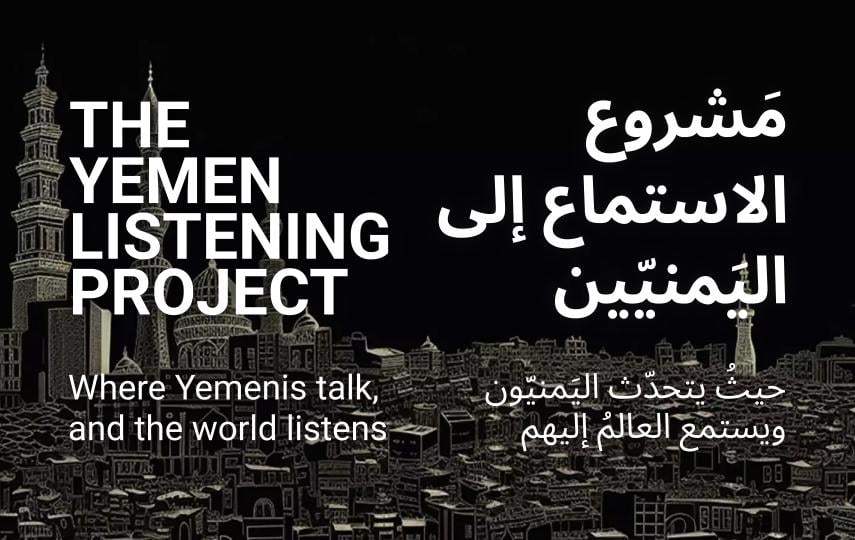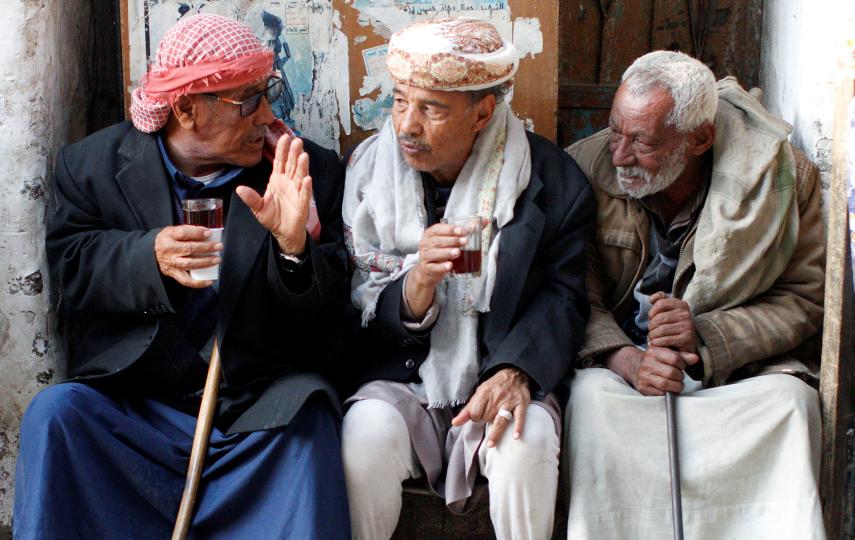Months after the start of new US sanctions targeting Yemen’s Houthi movement, ordinary Yemenis say they are struggling to access money transfers from outside the country that – after nine years of war and economic collapse – have become a lifeline for many.
Yemenis were already facing rising food prices and the collapse of basic services in the midst of a massive humanitarian catastrophe. Now, people The New Humanitarian spoke to say the difficulty of accessing money transfers has left them scrambling for alternatives while daily life has become even more precarious.
The US imposed the new sanctions on four Houthi-linked individuals, as well as currency exchanges affiliated with them, in mid-January after the Houthis began attacking ships in the Red Sea in what they say is an act of solidarity with Palestinians in Gaza. The US also classified the Houthis – who control many of Yemen's population centres – as a 'Specially Designated Global Terrorist group' (SDGT), and the US and UK have launched retaliatory airstrikes against Houthi targets inside Yemen.
Four out of five people live in poverty in Yemen, and many have come to rely on remittances from abroad to get by. The World Bank estimates that these remittances come to $3.77 billion each year. Of this, $2.3 billion (61%) is sent from Saudi Arabia and 29% from other Gulf countries. Since the sanctions came into place, many Yemenis say they are struggling to access their savings and to receive money from relatives abroad.
Yemen’s long war has pitted the Houthis against an internationally recognised government and its allies, including a United Arab Emirates and Saudi Arabia-led coalition. According to the UN, over half of Yemen’s more than 34 million people need some sort of humanitarian assistance, some 17.6 million are facing food insecurity, and nearly half of all children under five suffer from moderate to severe stunting.
Mrs Rassam, a 25-year-old stay at home mother who declined to share her first name, told The New Humanitarian that her husband, Talal Rassam, is the only breadwinner for their family of four, his parents, and his six siblings.
They all live in a 110-square-metre apartment in the capital, Sana’a, but for the past five years Talal has lived in Riyadh, where he works as a cashier at a restaurant. He makes 4,000 Saudi riyals a month ($1,066), most of which he sends back to Yemen for his family’s rent, school fees, university tuition for his sister, and his father’s weekly dialysis sessions.
Mrs Rassam has not received any money since the sanctions were announced, as the exchange house where her husband transfers money halted operations. Now, she’s finding it difficult to care for her family.
“He has to wait for this month’s salary to find a way to send us the money,” Mrs Rassam said in March. “The family is now struggling, especially that schools do not allow students to sit for the final exams until we pay the last tuition fee instalment. Now, the landlord is also asking for rent money, which is more than a month late.”
‘The transfers have stopped’
Most Yemenis in the Gulf earn modest wages working in retail, restaurants, construction, and mobile phone shops, Mustapha Nasr, head of the Studies and Economic Media Center (SEMC) in Taiz, Yemen, told The New Humanitarian.
“This is why most of them save their salaries in these exchange houses and then send most of it to their families in Yemen,” Nasr explained. “The recent sanctions will increase the sufferings of Yemeni families and lead to a decline in money transfers.”
Exchange houses, also known as money transfer companies, act as banks for many expatriate workers in countries like Saudi Arabia. These companies often offer a slightly better exchange rate than banks and send money to smaller towns and villages not served by other financial institutions.
Mohammed Abdulmalek, a 54-year-old father of nine, said that his family was financially secure before the recent sanctions thanks to his work as a contractor in the United Arab Emirates.
“I deposited all the money that I have been saving for the past four years in one of the money transfer companies that was sanctioned,” he told The New Humanitarian by phone from the UAE in February. Even before the sanctions came into place, he was told he could not withdraw his money.
He declined to name the company, but several Yemenis said that even money transfer companies that had not been sanctioned had stopped sending money to Yemen or allowing withdrawals. Some began as soon as the new sanctions were announced, apparently acting out of an abundance of caution, or to make sure that their networks are not connected in some way to sanctioned companies.
“I had decided that this would be the last year for me away from my family. I wanted to return to Yemen and start my own business to secure their future,” Abdulmalek said. “I was told that I will be able to withdraw my money in instalments. But this means that my dream will have to wait.
While some Yemeni expats are relatively financially secure, they say that the country’s dire humanitarian situation means they need to pay the medical and living expenses for their extended families.
“On average, I send more than 9,000 Saudi Riyals ($2,400) a month [to Yemen] from my salary as a dentist,” Mohamed Massoud, a Yemeni living in Saudi Arabia, said in March. “But the transfers have stopped after the sanctions.”
“I have a large family in [the Houthi-controlled central] Ibb province, and they need at least 5,000 Saudi Riyals ($1,300) a month.” He said he planned to look for other ways to send money.
Abdullah al-Ridaei, a Yemeni living in Michigan, a US state with a large Yemeni population, said that he had been sending much of the profits from his car washing business back to Yemen. The remittances he and his Yemeni business partners sent via a Yemeni company covered the living expenses of 10 families in the central al-Bayda province.
“Sometimes I would transfer more than $40,000 each month,” he said. But with the most recent sanctions, I stopped sending money through this company, which was directly impacted by the sanctions,” said al-Ridaei. “I do not want to be associated with it.”
“If I am dealing with a company on the sanctions list it will create other problems for me, especially in case restrictions are placed on those who transfer large sums of money to Yemen,” he added, declining to name the company.
Impact of sanctions on aid
The new sanctions have heightened fears that the banking system and aid operations could be affected, both of which are key to keeping average Yemenis going. This comes around six months after the World Food Programme (WFP) paused much of its food aid to people living in northern areas under Houthi control because of funding shortages and a failure to agree with the group on who should receive aid.
“Ninety percent of Yemen’s food needs are imported,” said Nasr from SEMC, stressing the importance of cash flow from abroad to “ensure the continuation of foreign trade that alleviates the humanitarian crisis in the country.”
A December WFP survey found that 51% of households across the country “indicated lack of access to adequate food” – a 9% increase from the previous month. It also noted a 40% decline in fuel imports to Yemen’s Red Sea ports from November, and a 17% decline in food imports to the Red Sea ports along with a 62% decline to the southern ports of Aden and Mukalla.
Angela Abou Isbaa, head of the Yemeni NGO Angela for Development and Humanitarian Response, told The New Humanitarian that humanitarian organisations in Yemen have long been struggling with a “major lack of money transfers from abroad over the past years”, because the war has destroyed so much of the country’s infrastructure.
The NGO works on humanitarian and development projects in Houthi-controlled areas, including food security, education, shelter, economic empowerment, and WASH (water, sanitation and hygiene).
The US has issued special licences for businesses and aid groups to work in sanctioned areas.“[But] the exemptions that the United States put in place for humanitarian organisations are not enough,” Isbaa said.
Along with the latest round of sanctions, the US issued a set of “licences,” which are exemptions to the rules. They are supposed to allow personal remittances to continue, port and air operations to function, and NGOs to be able to provide aid. Designating the Houthis as a SGDT technically allows aid work to continue in Yemen, Isbaa explained. It’s just more complicated.
“The sanctions involve several entities that humanitarian organisations have to deal with, including money exchange houses, merchants, [and] importers, and they all constitute one interconnected network for humanitarian work,” Nasr added.
“This means that banks in areas under Houthi control will still receive money transfers from abroad, but there will be a verification process for some people and entities affiliated with the group,” he said.
The executive directors of three private and government-owned banks in Houthi-controlled areas told The New Humanitarian that they had seen restrictions on money transfers, particularly on leaders of the group and transfers to entities affiliated with the Houthis.
The directors requested anonymity for fear of reprisal from Houthi leaders. Transfers of smaller sums of money from other Gulf countries using the hawala system – a money transfer method common in the region that doesn’t use banks or official transfer companies – won’t be affected by the sanctions, they noted.
More Yemenis may turn to these systems to send money to their families, but they won’t necessarily be a solution for aid groups or for people looking to send larger sums.
For those using the formal banking system, “there will be more requests for information about accounts, which will pose a hurdle for banks and foreign money transfers into Yemen,” one bank director said. “Major bank transfers will face restrictions because banks will not be able to process them in a timely manner.”
This article was published in collaboration with Egab. Edited by Rania ElMalky, Tom Brady, and Annie Slemrod.






